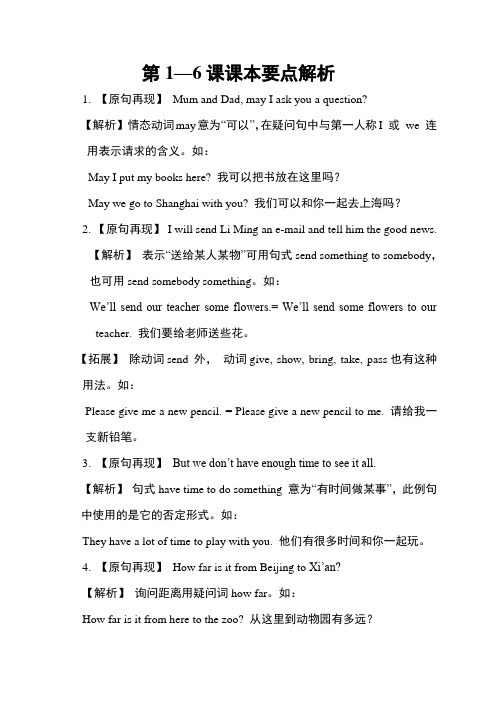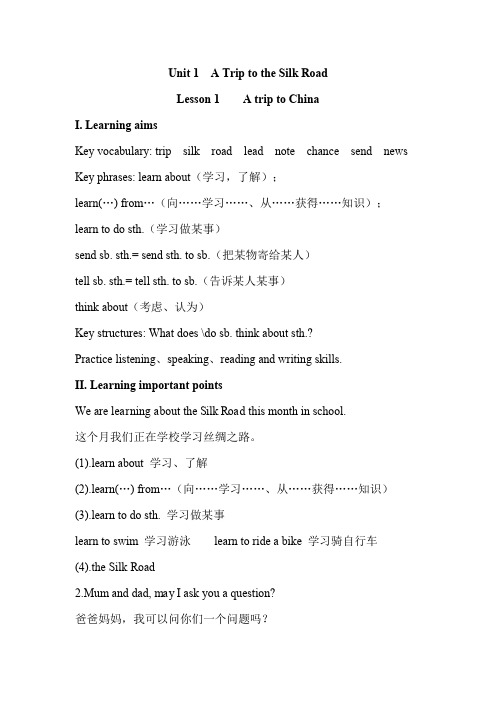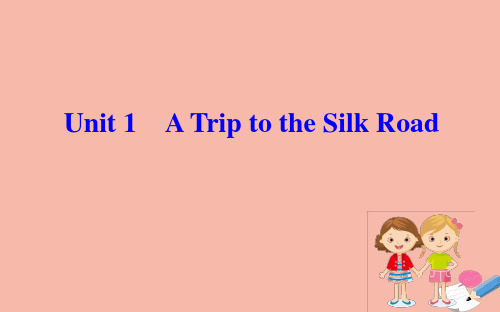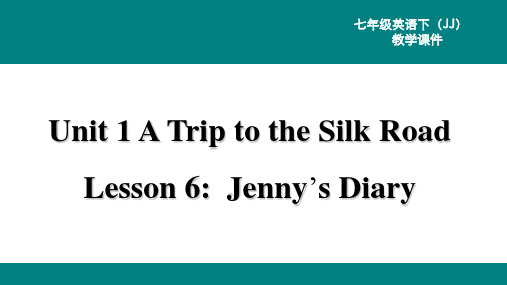冀教版七年级下册英语教学课件_第一单元_Unit 1 A Trip to the Silk Road第二课时
冀教版七下英语Unit1 A Trip to the Silk Road Lesson5_精品

[seif]
[`kæməl]
[fɔ:l]
Look ! Danny and Jenny onto the camels !
[`ɔntu]
Yay ! This is fun!
[jei]
Presentation Learn some new words
another [ə`nʌðə] adj. 另外的;又一 pron. 另一个
Make a choice. 1. I don’t like this pair of pants.
Would you like to show me___? A. another one B. the other one C. another pair D. the other pair 2. Their bags are the same colours__ours. A. like B. as C. from D. for
1 Listen and write true (T) or false (F).
1.Dunhuang is famous as the City of
Sands.(T)
2.Marco Polo Came to Dunhuang
a long time ago.(T)
3.The camel is not safe and Danny falls
[keiv]
[sænd]
They can’t believe it ! They are walking on the
[bi`li:v]
same road as Marco Polo.
[`mɑ:kəu,`pəuləu]
It is safe to ride a camel. You will not fall off.
英语:unit 1 《a trip to beijing.》教案(5)(冀教版七年级下)

7、 What do you think of sth ? ——你认为……怎么样?是询问某人对某事的看法的常用语。如: What
do you think of my new clothes ? 8、How about……?/ What about……? ——……怎么样?用来询问消息、提供建议或征求意见的常
12、call 喊、打电话
call sb (on the telephone) 给某人打电话
call sb from spl 从某地打电话给某人 My father called me from Shenzhen yesterday. 13、leave spl1 forspl2 离开某地到达某地
14、stay with sb 和某人住在一起 15、交通方式:①、by bus/bike/car/train/plane/sea /motor bike/boat/taxi
3、 excited 感到兴奋的/激动的,主语必须是人,常用 be excited about / at sth exciting 令人兴奋的/激动的,主语必须是物或用来修饰事物,如: We areall about the news (消息) 。
4、喜欢干某事 :love doing sth —— 表示习惯性的、经常性的动作或个人爱好; love to do sth —— 表示偶尔的某一次的行为,如: He loves English book but hedoesn’t love (用 read 的适当形式填空) English book now .
9、祈使句——用来表达请求、询问、劝告、建议等语气的句子。常见句型: A、肯定式:①、行为动词原型+宾语+其他,如:Sit down ,please.
Look at theBlackboard,please ; ②、以系动词 Be 开头,即:Be+名词或形容词+其他,
冀教版英语七下Unit 1《Lesson 1 A Trip to China》教学设计

冀教版英语七下Unit 1《Lesson 1 A Trip to China》教学设计一. 教材分析冀教版英语七下Unit 1《Lesson 1 A Trip to China》主要介绍了中国的旅游景点,包括长城、故宫、颐和园等。
本课以旅游为主题,通过介绍中国的旅游景点,让学生学习相关的词汇和句型,提高他们的听说读写能力。
教材内容丰富,插图精美,有利于激发学生的学习兴趣。
二. 学情分析七年级的学生已经掌握了一定的英语基础知识,具备一定的听说读写能力。
他们对新鲜事物充满好奇,喜欢通过图片、视频等直观的方式学习。
但部分学生可能对中国的旅游景点了解不多,因此需要在教学中补充相关背景知识。
三. 教学目标1.知识目标:学生能掌握相关词汇,如tourist, attraction, visit等;能运用所学句型介绍中国的旅游景点。
2.能力目标:学生能在图片或情景的帮助下,正确使用所学词汇和句型进行交流。
3.情感目标:激发学生对祖国旅游景点的热爱,培养他们的民族自豪感。
四. 教学重难点1.重点:学生能正确掌握相关词汇和句型,进行简单的交流。
2.难点:学生能在实际情境中灵活运用所学词汇和句型。
五. 教学方法1.情境教学法:通过设置旅游情境,让学生在实际环境中运用所学知识。
2.交际法:引导学生进行角色扮演,进行实际交流。
3.任务型教学法:通过完成具体任务,提高学生的综合语言运用能力。
六. 教学准备1.教师准备相关旅游景点的图片、视频等教学资源。
2.学生准备笔记本,用于记录所学内容。
七. 教学过程1.导入(5分钟)教师通过展示中国的旅游景点图片,引导学生谈论他们所了解的旅游景点,为新课的学习营造轻松的氛围。
2.呈现(10分钟)教师展示《Lesson 1 A Trip to China》的课文,让学生整体感知课文内容。
同时,教师讲解新词汇和句型,如tourist, attraction, visit等。
3.操练(10分钟)教师学生进行角色扮演,模拟旅游场景,让学生运用所学词汇和句型进行交流。
冀教版英语七年级下册Unit 1 A Trip to the Silk Road课文要点解析

第1—6课课本要点解析1. 【原句再现】Mum and Dad, may I ask you a question?【解析】情态动词may意为“可以”,在疑问句中与第一人称I 或we 连用表示请求的含义。
如:May I put my books here? 我可以把书放在这里吗?May we go to Shanghai with you? 我们可以和你一起去上海吗?2. 【原句再现】I will send Li Ming an e-mail and tell him the good news.【解析】表示“送给某人某物”可用句式send something to somebody,也可用send somebody something。
如:We’ll send our teacher some flowers.= We’ll send some flowers to our teacher. 我们要给老师送些花。
【拓展】除动词send 外,动词give, show, bring, take, pass也有这种用法。
如:Please give me a new pencil. = Please give a new pencil to me. 请给我一支新铅笔。
3. 【原句再现】But we don’t have enough time to see it all.【解析】句式have time to do something 意为“有时间做某事”,此例句中使用的是它的否定形式。
如:They have a lot of time to play with you. 他们有很多时间和你一起玩。
4. 【原句再现】How far is it from Beijing to Xi’an?【解析】询问距离用疑问词how far。
如:How far is it from here to the zoo? 从这里到动物园有多远?【拓展】how long用于询问长度或时间长短。
【冀教版】七年级英语下册:Unit 1 A Trip to the Silk Road全单元教案

Unit 1 A Trip to the Silk RoadLesson 1 A trip to ChinaI. Learning aimsKey vocabulary: trip silk road lead note chance send news Key phrases: learn about(学习,了解);learn(…) from…(向……学习……、从……获得……知识);learn to do sth.(学习做某事)send sb. sth.= send sth. to sb.(把某物寄给某人)tell sb. sth.= tell sth. to sb.(告诉某人某事)think about(考虑、认为)Key structures: What does \do sb. think about sth.?Practice listening、speaking、reading and writing skills.II. Learning important pointsWe are learning about the Silk Road this month in school.这个月我们正在学校学习丝绸之路。
(1).learn about 学习、了解(2).learn(…) from…(向……学习……、从……获得……知识)(3).learn to do sth. 学习做某事learn to swim 学习游泳learn to ride a bike 学习骑自行车(4).the Silk Road2.Mum and dad, may I ask you a question?爸爸妈妈,我可以问你们一个问题吗?May I…? 此句式表达有礼貌地请求对方允许,语气十分委婉,还可以表达为:Could I \ Can I?其肯定回答常用:Yes.可以。
\ Sure.\ Certainly.当然可以。
2020版七年级英语下册Unit1ATriptotheSilkRoadLesson1ATriptoChina课件(新版)冀教版

肯定 Yes, you may/can. 回答 Yes, please.
Sure/Certainly/ Of course. 否定 No, you can’t. 回答 Sorry, you can’t.
You’ d better not.
Step 3 考点·练 ( D )①(2019·宿迁中考)—Mum, may I go to see a film with my cousin? —You ________go if you have finished your homework. A. must B. need C. should D. can
5. 学习; 了解 _le_a_r_n_a_b__o_u_t
6. 由……制成 _b_e_m__a_d_e_o_f_
7. 有机会做
_h_a_v_e_a__c_h_a_n_c_e_t_o_d__o_. _. _. _
8. 寄给某人某物 _s_en__d_s_b_._s_th__. _/s_e_n_d__st_h_.__to__s_b_.
【拓展】 lead的名词形式leader 意为“领导者; 领袖” Chairman Mao was a very great leader. 毛主席是一个非常伟大领袖。
Step 4 考点·练 ①Mr Li often _le_a_d_s_ us to the park to have a picnic. ②这条小路通向一个村庄。 This path _le_a_d_s_ _to_ a village. ③张老师将会带领这个小组去北京。 Mr Zhang _w_i_l_l _le_a_d_ the group _to_ Beijing.
Ⅲ. Read the dialogue and answer the questions. 1. What’s Jenny learning about this month in school? _S_h_e_i_s_l_e_a_rn__in_g__a_b_o_u_t_t_h_e_S_i_l_k_R__o_a_d_(_t_h_is_m__o_n_t_h__in_ _s_ch__o_o_l)_. _
七年级英语下册Unit1ATriptotheSilkRoadLesson2习题课件新版冀教版

1. I'd like to give my thanks to Alice for sharing her _e_x_c_it_in__g_(令人兴奋的) experiences in Africa.
2. We are ____A____ about the ________ news that
11. —You can take ____B____ bus to the museum.
—No, I will go there by ________ bike.
【改编•攀枝花】
A. /; the
B. a; /
C. the; the
D. a; a
12. We can take a plane to go there.(改为同义句) We can go there ____b_y___ __p_l_a_n_e__.
B. clear enough
C. enough clearly
D. clearly enough
二、用所给单词的适当形式完成句子 11. There are three __h_u_n_d_r_e_d__ (hundred) and sixty-five books.
12. The Smiths w__il_l_l_e_a_v_e (leave) for Sichuan next week.
—____A_____ exciting the news is! 【中考•武威】
A. How
B. What
C. What an
D. How an
7. They will ____A____ Beijing in two days.
A. arrive in
B. arrive
冀教版七年级下册英语精品教学课件 Unit 1 Lesson 6 Jenny's Diary

Monday Tuesday Wednesday Thursday Friday Saturday Sunday
Mon. Tues. Wed. Thur. Fri. Sat. Sun.
January February March
April May June July August September October November December
3. What event was held at the Bird's Nest in 2008? It held the 2008 Olympics.
4. What new instrument did Jenny learn about? The erhu.
L3.eWt'sorDkoinItp!airs. What did Jenny learn about on the trip?
The Bird’s Nest
It is only a few years old.
The Terra Cotta Warriors They are over 2 000 years old.
The Yellow River
It is about 5 400 kilometres long.
4. Work in groups. Suggest some places Jenny can see on her
去年 上周 上个月 最后
3. We will fly home tomorrow. (教材P12)
fly (to) spl. 坐飞机去某地, 相当于go to spl. by plane, 当 to后跟地点副词时省略to。
【例句】 I’m flying to Hong Kong tomorrow. 明天我要乘飞机去香港。
- 1、下载文档前请自行甄别文档内容的完整性,平台不提供额外的编辑、内容补充、找答案等附加服务。
- 2、"仅部分预览"的文档,不可在线预览部分如存在完整性等问题,可反馈申请退款(可完整预览的文档不适用该条件!)。
- 3、如文档侵犯您的权益,请联系客服反馈,我们会尽快为您处理(人工客服工作时间:9:00-18:30)。
〖冀教版〗
Unit 1
A Trip to the Silk Road
Lesson 2
Meet You in Beijing
New words
exciting 使人激动的
kilometer 千米,公 里alFra bibliotekng 沿着……
culture 文化
special 特殊的;特别的 arrive 到达, 抵达 Terra Cotta Warrior 兵马俑
Homework
1.Review and recite the important points of the lesson. 2.Try to make a travel plan for your family and write down your reasons. 3.Preview Lesson 3.
☆教材解读☆ 1.How far is it from Beijing to Xi’an? how far意为“多远”,用来询问距离或路程 的远近,常用句型为:How far is it from A to B? 或 How far is B from A?答语为: It’s …metre(s) /kilometre(s).。 【拓展】 how long用于询问长度或时间 长短。 How long is this river?这条河有多长? How long will you stay in Beijing? 你们要在北京逗留多长时间?
3.Arrive in Beijing and take a train to Xi’an. “到达某地”的英语表达形式:arrive in(大地点)/at(小地点) = get to = reach。“到家”arrive home = get home; 到那 arrive there = get there。 【注意】 如果没有提到“地点”, 用arrive。 When will you arrive? 你将会什么时候到达?
2.But we don’t have enough time to see it all. have time to do something 意为“有 时间做某事”,此例句中使用的是它的 否定形式。 They have a lot of time to play with you.他们有很多时间和你一起玩。
Read the lesson and answer the following questions. (1)Who will meet Jenny and Danny in Beijing? Wang Mei and Li Ming. (2)What will they do along the way? They will learn about the history and culture of China along the way. (3)How long will Jenny and Danny stay in China? About ten days.
Fill in the blanks with the correct forms of the given words and expressions.
along,exciting,special,how far,arrive in will you arrive in Nanjing? 1.—When —Next week. 2. How far is it from Beijing to London? e here.Let me tell you some exciting news. 4.—Can I eat something special in the U.S.? —Sure. 5.We will see many beautiful places along the way.
Work in pairs.Look at the map and take turns asking and answering:How far is it from…to…? Example: A:How far is it from Beijing to Xi’an? B:It’s about 1 114 kilometres.
leave 动身; 出发;
离开
Wild Goose Pagoda 大雁塔
Listen to the text and answer the following questions. (1)Who will come to China? Jenny and Danny. (2) Where will be their first stop? Xi’an. (3) How far is it from Beijing to Xi’an? About 1 114 kilometres. (4)Will they visit Dunhuang? Yes, they will.
e back to Beijing and leave Beijing. 【辨析】 leave sp.,leave for sp. (1)leave sp.意为“离开某地”。 He wants to leave Shanghai tomorrow. 他明天想离开上海。 (2)leave for sp.意为“前往,离开去某地”。 He wants to leave for Shanghai tomorrow.他明 天要去上海。(相当于 He wants to go to Shanghai tomorrow.) 【注意】 当表示“把某物忘在某地”时,用 leave。 He forgot his book.他忘记了他的书。 He left his book at home. 他把他的书落在了家里。
